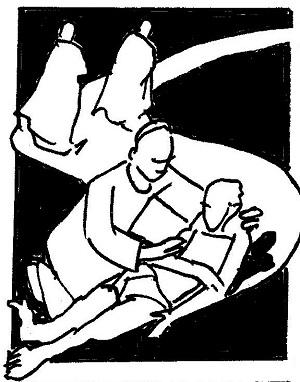

"Go and do likewise" (Luke 10:37).
The parable of the Good Samaritan is prompted by the question from the scholar of the law about just who he is obligated to as neighbor. Jesus' story depicts a Jewish victim, left for dead on the side of the road to Jericho, ignored by two legalistic Jewish officials, but rescued by a hated Samaritan stranger, Israel's worst enemy. The triumph of love over legalism defined neighborliness. The greatest commandment, love of God and love of neighbor, the very heart of the Law, is determined not by ritual purity, legal perfection or piety, but by how we respond to anyone we encounter wounded on the side of the road.
In stunning reversal of the Jewish audience's anticipation that a Jew would be saved by the priest or the Levite, or later by a Jewish layman, the naked, wounded victim is saved by a Samaritan. The scholar's perfectly defined world is turned upside down and its parameters blown out to universal responsibility by the parable. "Who then, in your opinion, was neighbor to the robbery victim?" Jesus asks the lawyer." He can only answer, "The one who treated him with mercy."
What will we make of this powerful story today? What do you make of it in your own life and situation? The Good Samaritan or fill in the blank-- your worst enemy-- comes to help you understand the mystery of God's unconditional for you. The face of God is mercy. To respond to this God, to be transformed by his gaze, to love one another as God loves us, this is the greatest commandment.
Advertisement






